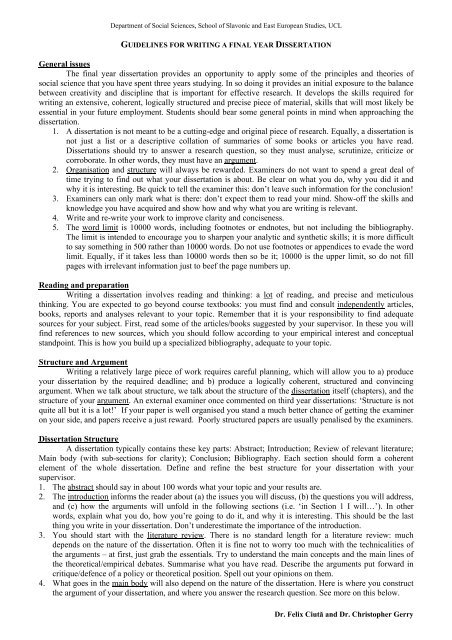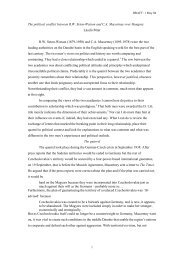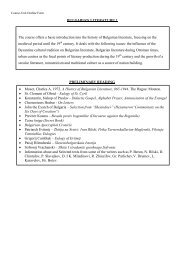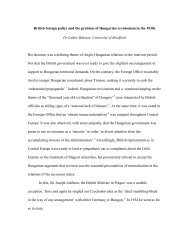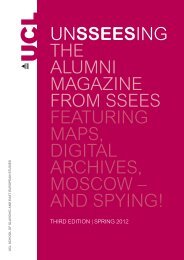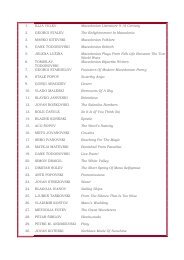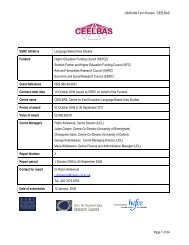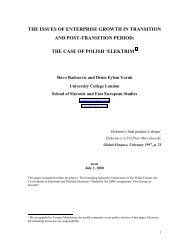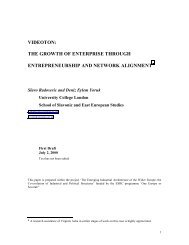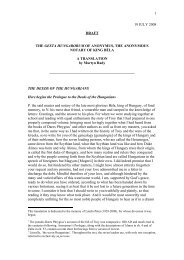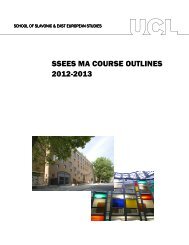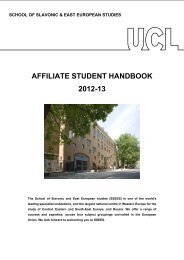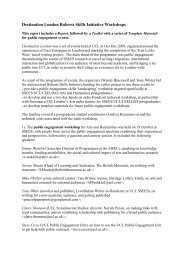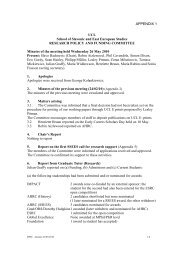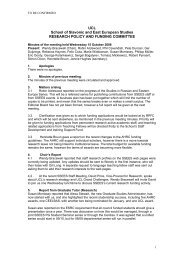Guidelines for Writing a Final Year Dissertation - the UCL School of ...
Guidelines for Writing a Final Year Dissertation - the UCL School of ...
Guidelines for Writing a Final Year Dissertation - the UCL School of ...
You also want an ePaper? Increase the reach of your titles
YUMPU automatically turns print PDFs into web optimized ePapers that Google loves.
Department <strong>of</strong> Social Sciences, <strong>School</strong> <strong>of</strong> Slavonic and East European Studies, <strong>UCL</strong><br />
GUIDELINES FOR WRITING A FINAL YEAR DISSERTATION<br />
General issues<br />
The final year dissertation provides an opportunity to apply some <strong>of</strong> <strong>the</strong> principles and <strong>the</strong>ories <strong>of</strong><br />
social science that you have spent three years studying. In so doing it provides an initial exposure to <strong>the</strong> balance<br />
between creativity and discipline that is important <strong>for</strong> effective research. It develops <strong>the</strong> skills required <strong>for</strong><br />
writing an extensive, coherent, logically structured and precise piece <strong>of</strong> material, skills that will most likely be<br />
essential in your future employment. Students should bear some general points in mind when approaching <strong>the</strong><br />
dissertation.<br />
1. A dissertation is not meant to be a cutting-edge and original piece <strong>of</strong> research. Equally, a dissertation is<br />
not just a list or a descriptive collation <strong>of</strong> summaries <strong>of</strong> some books or articles you have read.<br />
<strong>Dissertation</strong>s should try to answer a research question, so <strong>the</strong>y must analyse, scrutinize, criticize or<br />
corroborate. In o<strong>the</strong>r words, <strong>the</strong>y must have an argument.<br />
2. Organisation and structure will always be rewarded. Examiners do not want to spend a great deal <strong>of</strong><br />
time trying to find out what your dissertation is about. Be clear on what you do, why you did it and<br />
why it is interesting. Be quick to tell <strong>the</strong> examiner this: don’t leave such in<strong>for</strong>mation <strong>for</strong> <strong>the</strong> conclusion!<br />
3. Examiners can only mark what is <strong>the</strong>re: don’t expect <strong>the</strong>m to read your mind. Show-<strong>of</strong>f <strong>the</strong> skills and<br />
knowledge you have acquired and show how and why what you are writing is relevant.<br />
4. Write and re-write your work to improve clarity and conciseness.<br />
5. The word limit is 10000 words, including footnotes or endnotes, but not including <strong>the</strong> bibliography.<br />
The limit is intended to encourage you to sharpen your analytic and syn<strong>the</strong>tic skills; it is more difficult<br />
to say something in 500 ra<strong>the</strong>r than 10000 words. Do not use footnotes or appendices to evade <strong>the</strong> word<br />
limit. Equally, if it takes less than 10000 words <strong>the</strong>n so be it; 10000 is <strong>the</strong> upper limit, so do not fill<br />
pages with irrelevant in<strong>for</strong>mation just to beef <strong>the</strong> page numbers up.<br />
Reading and preparation<br />
<strong>Writing</strong> a dissertation involves reading and thinking: a lot <strong>of</strong> reading, and precise and meticulous<br />
thinking. You are expected to go beyond course textbooks: you must find and consult independently articles,<br />
books, reports and analyses relevant to your topic. Remember that it is your responsibility to find adequate<br />
sources <strong>for</strong> your subject. First, read some <strong>of</strong> <strong>the</strong> articles/books suggested by your supervisor. In <strong>the</strong>se you will<br />
find references to new sources, which you should follow according to your empirical interest and conceptual<br />
standpoint. This is how you build up a specialized bibliography, adequate to your topic.<br />
Structure and Argument<br />
<strong>Writing</strong> a relatively large piece <strong>of</strong> work requires careful planning, which will allow you to a) produce<br />
your dissertation by <strong>the</strong> required deadline; and b) produce a logically coherent, structured and convincing<br />
argument. When we talk about structure, we talk about <strong>the</strong> structure <strong>of</strong> <strong>the</strong> dissertation itself (chapters), and <strong>the</strong><br />
structure <strong>of</strong> your argument. An external examiner once commented on third year dissertations: ‘Structure is not<br />
quite all but it is a lot!’ If your paper is well organised you stand a much better chance <strong>of</strong> getting <strong>the</strong> examiner<br />
on your side, and papers receive a just reward. Poorly structured papers are usually penalised by <strong>the</strong> examiners.<br />
<strong>Dissertation</strong> Structure<br />
A dissertation typically contains <strong>the</strong>se key parts: Abstract; Introduction; Review <strong>of</strong> relevant literature;<br />
Main body (with sub-sections <strong>for</strong> clarity); Conclusion; Bibliography. Each section should <strong>for</strong>m a coherent<br />
element <strong>of</strong> <strong>the</strong> whole dissertation. Define and refine <strong>the</strong> best structure <strong>for</strong> your dissertation with your<br />
supervisor.<br />
1. The abstract should say in about 100 words what your topic and your results are.<br />
2. The introduction in<strong>for</strong>ms <strong>the</strong> reader about (a) <strong>the</strong> issues you will discuss, (b) <strong>the</strong> questions you will address,<br />
and (c) how <strong>the</strong> arguments will unfold in <strong>the</strong> following sections (i.e. ‘in Section 1 I will…’). In o<strong>the</strong>r<br />
words, explain what you do, how you’re going to do it, and why it is interesting. This should be <strong>the</strong> last<br />
thing you write in your dissertation. Don’t underestimate <strong>the</strong> importance <strong>of</strong> <strong>the</strong> introduction.<br />
3. You should start with <strong>the</strong> literature review. There is no standard length <strong>for</strong> a literature review: much<br />
depends on <strong>the</strong> nature <strong>of</strong> <strong>the</strong> dissertation. Often it is fine not to worry too much with <strong>the</strong> technicalities <strong>of</strong><br />
<strong>the</strong> arguments – at first, just grab <strong>the</strong> essentials. Try to understand <strong>the</strong> main concepts and <strong>the</strong> main lines <strong>of</strong><br />
<strong>the</strong> <strong>the</strong>oretical/empirical debates. Summarise what you have read. Describe <strong>the</strong> arguments put <strong>for</strong>ward in<br />
critique/defence <strong>of</strong> a policy or <strong>the</strong>oretical position. Spell out your opinions on <strong>the</strong>m.<br />
4. What goes in <strong>the</strong> main body will also depend on <strong>the</strong> nature <strong>of</strong> <strong>the</strong> dissertation. Here is where you construct<br />
<strong>the</strong> argument <strong>of</strong> your dissertation, and where you answer <strong>the</strong> research question. See more on this below.<br />
Dr. Felix Ciută and Dr. Christopher Gerry
Department <strong>of</strong> Social Sciences, <strong>School</strong> <strong>of</strong> Slavonic and East European Studies, <strong>UCL</strong><br />
5. Your conclusion should summarise <strong>the</strong> previous sections, drawing <strong>the</strong> threads <strong>of</strong> <strong>the</strong> argument toge<strong>the</strong>r.<br />
The conclusion could <strong>of</strong>fer some comments about unresolved problems: saying, <strong>for</strong> example, how your<br />
research could be extended, or how do you see <strong>the</strong> resolution <strong>of</strong> <strong>the</strong> problems highlighted by your<br />
argument.<br />
6. For in<strong>for</strong>mation on referencing and bibliography, consult <strong>the</strong> additional documents provided. Remember<br />
that a dissertation must have a bibliography and a referencing apparatus. Footnotes can be used <strong>for</strong> short<br />
clarifications and extensions <strong>of</strong> your argument that would o<strong>the</strong>rwise interrupt <strong>the</strong> flow <strong>of</strong> your paper. Try to<br />
keep <strong>the</strong>m to a minimum. Appendices can be used <strong>for</strong> material <strong>of</strong> a detailed background or ancillary nature,<br />
too long <strong>for</strong> a footnote. Appendices are <strong>of</strong>ten devoted to (a) descriptions <strong>of</strong> data sources and about how <strong>the</strong><br />
data have been trans<strong>for</strong>med; (b) listing data (but only when <strong>the</strong> data have been obtained from non-standard<br />
sources).<br />
Argument Structure<br />
A good argument is <strong>the</strong> essential ingredient <strong>of</strong> a dissertation. This means a clear, coherent and logical<br />
way in which your ideas are presented. This does not necessarily mean an original argument, and it does not<br />
only mean your personal opinion on <strong>the</strong> topic. You can, <strong>for</strong> example, follow certain authors or criticise <strong>the</strong>m;<br />
you can use an authors’ view on a topic or problem, but you must always explain why, and provide evidence<br />
that you have read about and understood <strong>the</strong> topic and <strong>the</strong> debates that surround it, including issues <strong>of</strong><br />
controversy.<br />
• The argument must be carefully structured to answer <strong>the</strong> research question <strong>of</strong> <strong>the</strong> dissertation. Construct<br />
your argument as clearly as possible. Use subheadings to ‘flag’ <strong>the</strong> key steps <strong>of</strong> this structure; examiners<br />
will appreciate this, as it shows clarity <strong>of</strong> thought and confident handling <strong>of</strong> <strong>the</strong> knowledge acquired.<br />
• Be careful and precise with <strong>the</strong> terms and concepts you use. Provide definitions <strong>for</strong> <strong>the</strong> central concepts;<br />
this shows your understanding <strong>of</strong> <strong>the</strong> topic and states clearly what perspective you use. This is important<br />
especially when <strong>the</strong>re are (and <strong>the</strong>re always are) competing approaches towards a problem.<br />
• When you’re dealing with concepts and <strong>the</strong>ories, be careful to identify and distinguish between: what a<br />
<strong>the</strong>ory claims; what its critics may argue that <strong>the</strong> <strong>the</strong>ory claims; what <strong>the</strong> critics may claim instead; what<br />
you may claim about any <strong>of</strong> <strong>the</strong>se. This demonstrates <strong>the</strong>oretical awareness and analytical skill, and will be<br />
adequately rewarded by all examiners.<br />
• When you’re dealing with policies and o<strong>the</strong>r empirical issues, show that you know what you’re talking<br />
about (don’t imagine that examiners will assume you know): state when a policy (say, macro-stabilisation<br />
or NATO enlargement) was enacted, in which country, and <strong>the</strong> reasons why it was enacted. Identify <strong>the</strong><br />
reason(s) why policy makers are interested in it. Most importantly, describe <strong>the</strong> social, political and<br />
economic aspects (e.g. poverty, inequality, inflation, or national security, ethnic integration, strategic<br />
stability) that <strong>the</strong> policy is meant to address.<br />
• State what your findings are: e.g. was macro stabilisation a success, or did NATO enlargement have <strong>the</strong><br />
expected effects? Do not fall into <strong>the</strong> trap <strong>of</strong> merely listing <strong>the</strong> reasons newspapers give, or <strong>of</strong> repeating<br />
what policy makers say. For instance, “The Russian government thought that macroeconomic stabilisation<br />
would result in long term prosperity” is not a reasoned <strong>the</strong>oretical argument. You should evaluate if this<br />
claim has any basis in social science <strong>the</strong>ories e.g. what does economic <strong>the</strong>ory say about such matters?<br />
• In <strong>the</strong> conclusion, you should present your judgement, based on <strong>the</strong> material you have already presented, <strong>of</strong><br />
<strong>the</strong> merits <strong>of</strong> <strong>the</strong> policy or <strong>the</strong>ory you have analysed. If you are unable to say if a policy or <strong>the</strong>ory is “good”<br />
or “bad”, say what fur<strong>the</strong>r in<strong>for</strong>mation would be needed. For example, if <strong>the</strong>re are multiple effects <strong>of</strong> a<br />
policy, say what fur<strong>the</strong>r tests and analyses would be needed to identify which effect is <strong>the</strong> most important.<br />
Plagiarism<br />
Plagiarism is a very serious <strong>of</strong>fence that can lead to severe sanctions, including expulsion from <strong>the</strong><br />
university. Plagiarism means cheating. All students must consult <strong>the</strong> <strong>UCL</strong> Policy on Plagiarism.<br />
• Plagiarism is defined as <strong>the</strong> presentation <strong>of</strong> ano<strong>the</strong>r person’s thoughts or words as though <strong>the</strong>y were a<br />
student’s own. Quotations from published/unpublished works <strong>of</strong> o<strong>the</strong>r persons – including web sources –<br />
must be clearly identified as such by being placed inside quotation marks. When you summarise ano<strong>the</strong>r<br />
person’s ideas or data, make a reference to that person and list <strong>the</strong> work referred to in <strong>the</strong> bibliography.<br />
Substituting words or phrases from a text with o<strong>the</strong>r words or phrases is plagiarism.<br />
• Do not string toge<strong>the</strong>r long quotations. Use quotations to support your argument not as a substitute <strong>for</strong> it.<br />
Examiners interpret long quotations as a sign <strong>of</strong> laziness. You will not be accused <strong>of</strong> plagiarism, so long as<br />
<strong>the</strong> quotations are in inverted commas and properly cited. Papers that are little more that collections <strong>of</strong><br />
quoted material normally attract a fail mark.<br />
Dr. Felix Ciută and Dr. Christopher Gerry


